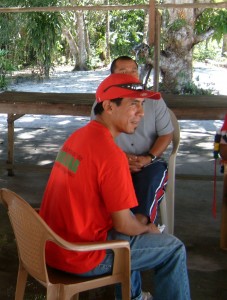As we talk with groups and individuals about our work and experiences in Suriname, one response is, “But, isn’t that what happens? The majority culture drives the development, and other cultures will have to compromise if they want to ‘succeed’.” Sometimes I hear statements such as, “Well, if they choose to live in remote places, I guess that’s what happens….” or “if they want things to be different they need to move to the city. They need to get with the program.”

I am struck by the logic of these statements. Yes, that is often what happens. Yes, it makes sense from a colonial perspective. But compromise often means assimilation….extinction. There has to be something better.
What does the “right to develop” mean to the interior people? When we spoke with several community leaders in 2007, they made it clear that they WANT to develop. But they want to develop on their own terms. This seems reasonable to me. I choose how I want to invest my money and my education. Why can’t they? I understand that there are limits to the decisions we can make; at the same time, the limits I face in America are a far cry different than the limits facing Suriname’s interior people. Sure, I don’t have a lot of money. I have to fundraise to produce films, but I CAN fundraise to produce films. I have the right to live where I want/need, and I have the access to the necessary resources (bank account, credit history, mortgage) to do so. When it comes right down to it, I can choose how I develop without compromising my cultural or personal identity. I think this identity/choice issue is the heart of what I am getting at.
Indigenous and Maroon communities do not own their land (at least in many cases), and they don’t have access to the financial or legal system to protect their interests. They can’t develop or move forward without basic access to healthcare, education, legal rights, etc. They meet a wall at almost every decision they make (individually and collectively); how CAN they develop and join ‘modern’ societies? When they are granted the right to own land or invest or be educated, they are required to do so in a manner that ignores their cultural norms and forces western practices. Why can’t a tribe collectively own their land? Why can’t a tribe expect the same access to water and electricity that another rural community can access?

In some of the footage that we have been playing with in the third film (Progress Update: Inside Suriname), a public health physician asks (paraphrased), “What would happen if we just assumed that every family in the US would lose one or more children to diarrhea?” I am quite certain that we would insist that we had the right to clean water and sanitary food. Why is that we think it is okay for remote peoples (and people that choose to live with a distinctly different cultural identity) to face the death of their children when water-born and food-born illness can be so easily prevented?

So, what is the answer for the interior people? (Westerners generally love to give answers, so let’s try this out!)
Answer #1: Leave tribal life. Move to the city. But, what then? The interior people are discriminated against along the coast. They lose what was good in their lives (their homes, their connection to place, their community relationships), and they still struggle to find enough food each day, access education, and find paying jobs.
Answer #2: Stay in their villages, living as best they can with the resources the have been using. But the resources are diminishing due to land concessions to corporations. The forest is cleared and burned. The rivers are filled in with mud and re-routed to meet the needs of industrial and small-scale mines. The food sources (fish, primarily) are polluted with toxins and heavy metals, such as cyanide and mercury.
It is a lose-lose situation for many interior people. If they stay, they are slowly losing their culture (through death, diminishing populations, etc.). If they leave, they rapidly lose their culture (through assimilation and the need to integrate quickly into the majority culture in order to survive.
My Western perspective has run out of answers. Perhaps the better approach is to ask: What COULD development mean to the interior people?
I think we should ask them.




